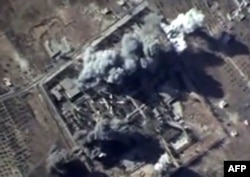A new wave of Islamic State (IS) group terror attacks has exposed the vulnerability of countries across Europe and the Middle East, forcing governments to reconsider existing policies and raising the possibility of new alliances against the organization.
Some former U.S. diplomats, however, say the United States must first develop a more coherent strategy to guide any broad effort against the extremists.
"If our ultimate goal is to help marginalize the forces of extremism, especially from the Middle East and Islamic radical groups such as IS, counter-terrorism and military operations are essential elements of any strategy," said Edward Djerejian, a former U.S. ambassador to Syria and former assistant secretary of state. "But there has to be a long-term generational strategy put in place that tries to get to some of the root causes of extremism."
The veteran diplomat cited several issues in the Arab world that cause violent extremism, including broken economies, systemic corruption, lack of political participation, faulty education systems and weak rule of law.
Michele Dunne, an analyst at the Carnegie Endowment for International Peace, argues that IS recruitment is boosted by the current policies of many Arab countries which exclude and repress opposition groups.
In Egypt, she said, "The rising number of the Sinai Bedouins flocking to join the so-called Sinai Province group, which is affiliated with IS, can be traced to the massive human rights abuse of the Sinai citizens, let alone the socioeconomic factors."
Djerejian agrees, saying radicalism in Sinai cannot be ended through military and counterterrorism operations alone. "There also have to be political, economic and social efforts in terms of the tribes in Sinai and the population there to integrate them more into the society."
Global unity deemed crucial
Like most U.S. political leaders, Djerejian opposes sending a large U.S. ground force to fight IS in Iraq and Syria. But he said every member of the international coalition must be committed to participate whole-heartedly.
"The Arab countries should do much more militarily in terms of counterterrorism," he said, especially since IS "is determined to overthrow them and establish their brand of Islamic rule."
Russian President Vladimir Putin edged closer to cooperation with other countries fighting IS, saying at a news conference Thursday with French President Francois Hollande that Moscow is prepared to work with a U.S.-led coalition to determine military targets in Syria. But a Kremlin spokesman Friday dampened expectations, saying the idea of a single anti-IS coalition was not possible now.
Military expert Anthony Cordesman said there is little evidence so far that Russia is striking at IS rather than Syrian rebel groups who threaten Syrian President Bashar al Assad, a Russian ally.
But Djerejian said that with Putin's emphasis now on confronting a real threat of Islamic extremism within the Russian Federation and abroad, there is an opportunity for U.S. diplomacy to bring Russia to some sort of coalition against IS.
"The art of diplomacy is getting beyond conflict management to conflict resolution, resolving the basic problem," Djerejian said. "If the situation in Syria is not resolved, there will be always a source of radicalism and extremism and instability in the Middle East."






